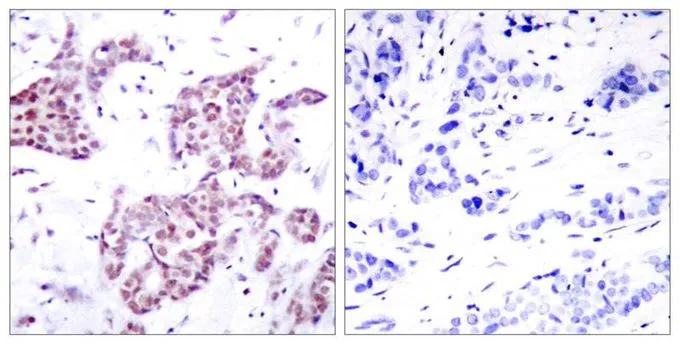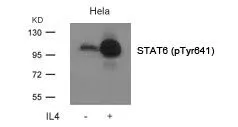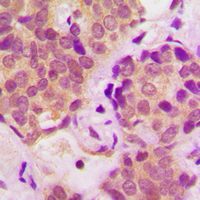
IHC-P analysis of human breast carcinoma tissue using GTX50124 STAT6 (phospho Tyr641) antibody. Left : Primary antibody Right : Primary antibody pre-incubated with the antigen specific peptide
STAT6 (phospho Tyr641) antibody
GTX50124
ApplicationsWestern Blot, ImmunoHistoChemistry, ImmunoHistoChemistry Paraffin
Product group Antibodies
TargetSTAT6
Overview
- SupplierGeneTex
- Product NameSTAT6 (phospho Tyr641) antibody
- Delivery Days Customer9
- Application Supplier NoteWB: 1:500-1:1000. IHC-P: 1:50-1:100. *Optimal dilutions/concentrations should be determined by the researcher.Not tested in other applications.
- ApplicationsWestern Blot, ImmunoHistoChemistry, ImmunoHistoChemistry Paraffin
- CertificationResearch Use Only
- ClonalityPolyclonal
- Concentration1 mg/ml
- ConjugateUnconjugated
- Gene ID6778
- Target nameSTAT6
- Target descriptionsignal transducer and activator of transcription 6
- Target synonymsD12S1644, HIES6, IL-4-STAT, STAT6B, STAT6C, signal transducer and activator of transcription 6, STAT, interleukin4-induced, signal transducer and activator of transcription 6, interleukin-4 induced, transcription factor IL-4 STAT
- HostRabbit
- IsotypeIgG
- Protein IDP42226
- Protein NameSignal transducer and activator of transcription 6
- Scientific DescriptionThe protein encoded by this gene is a member of the STAT family of transcription factors. In response to cytokines and growth factors, STAT family members are phosphorylated by the receptor associated kinases, and then form homo- or heterodimers that translocate to the cell nucleus where they act as transcription activators. This protein plays a central role in exerting IL4 mediated biological responses. It is found to induce the expression of BCL2L1/BCL-X(L), which is responsible for the anti-apoptotic activity of IL4. Knockout studies in mice suggested the roles of this gene in differentiation of T helper 2 (Th2) cells, expression of cell surface markers, and class switch of immunoglobulins. Alternative splicing results in multiple transcript variants.[provided by RefSeq, May 2010]
- Storage Instruction-20°C or -80°C,2°C to 8°C
- UNSPSC12352203



![IHC-P analysis of human renal cell carcinoma tissue using GTX17816 STAT6 antibody [STAT6/2410].](https://www.genetex.com/upload/website/prouct_img/normal/GTX17816/GTX17816_20200115_IHC-P_1087_w_23060620_981.webp)
![ICC/IF analysis of HeLa cells using GTX82814 STAT6 antibody [7D3]. Green : STAT6 Blue: DRAQ5 fluorescent DNA dye Red: Actin filaments](https://www.genetex.com/upload/website/prouct_img/normal/GTX82814/GTX82814_20170912_ICCIF_w_23061322_118.webp)
